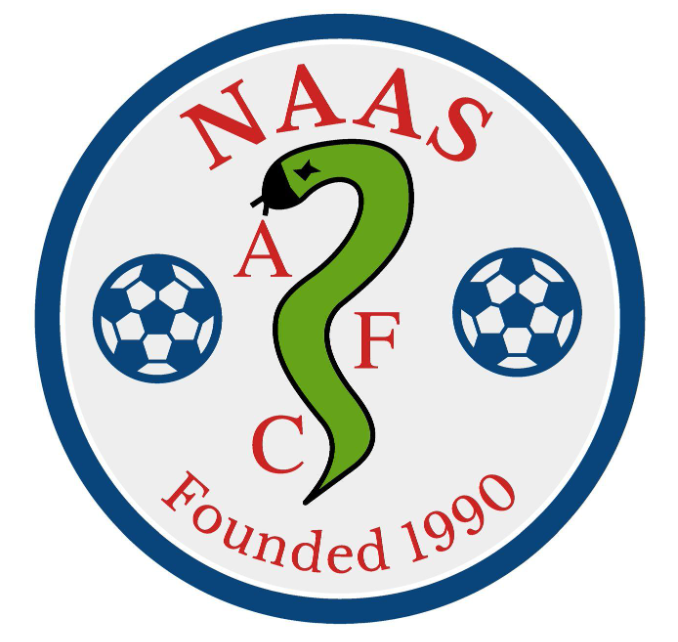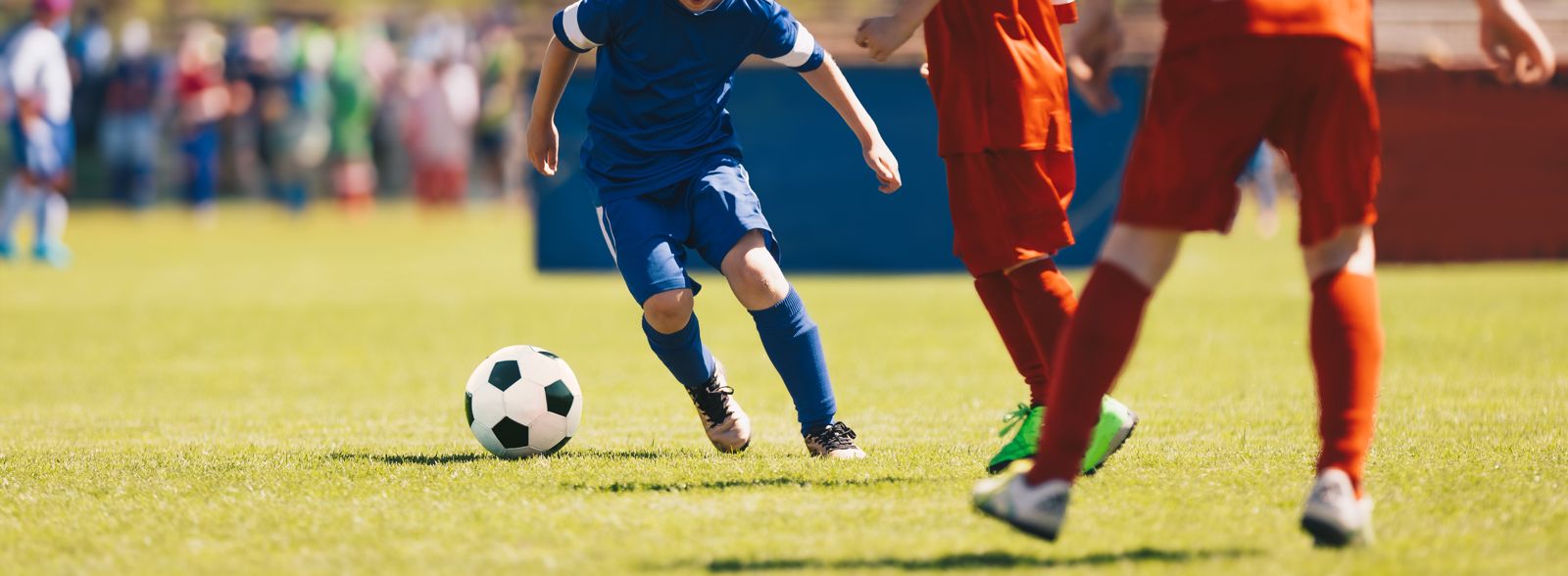NAAS AFC
Code of Conduct for Spectators
- Remember that although children play organised soccer they are not miniature professionals. Don’t place excessive pressure on children to perform to unrealistically high expectations. Children play soccer to develop their skills, to have fun and enjoy the game.
- Be on your best behaviour and lead by example. The behaviour of a teams supporters will often be remembered long after the result of the game. Be remembered for the right reasons.
- Applaud good play, sportsmanship and best effort by the visiting team as well as your own.
- Welcome and respect all your teams opponents. Without them there would be no match.
- Condemn the use of violence in all forms at every opportunity.
- Verbal abuse of players, match officials or opposing supporters cannot be accepted in any shape or form. Players or match officials should never be regarded as fair targets for ignorant or abusive behaviour.
NAAS AFC
Players Code of Conduct
Children in NAAS AFC are entitled to:
- Be safe
- Be treated with dignity, sensitivity and respect
- Participate in soccer on an equal basis, appropriate to their ability and stage of development.
- NAAS AFC have decided that all players are entitled to an equal amount of playing time.
- Be happy, have fun and enjoy soccer
- Make a complaint in an appropriate way and have it dealt with through a proper and effective complaints procedure
- Be afforded appropriate confidentiality
- Be listened to and to be believed
- Have a voice in the running of the club
Children should also be encouraged to realise that they also have responsibilities to treat other children, fellow players, coaches and volunteers with the same degree of fairness and respect.
- In this regard children in NAAS AFC should undertake to:
- play fairly, do their best and have fun
- be on their best behaviour at all times
- abide by all club rules
- make high standards of Fair Play the standard others want to follow
- respect opponents, they are not the enemy, they are partners in a sporting event
- shake hands before and after the match, whoever wins
- give opponents a hand if they are injured, put the ball out of play so they can get attention
- accept apologies from opponents when they are offered
- respect fellow team members and support them both when they do well and when things go wrong
- treat players from minority groups with the same respect you show other people
- be modest in victory and be gracious in defeat- “Be A Sport”
- approach the club Children’s Officer with any questions or concerns they might have. Coaches and parents should encourage children to speak out and support them in doing so.
Children in NAAS AFC should not:
- cheat
- use abusive language, or argue with, the referee, officials, team mates or opponents
- use violence, use physical contact only when it is allowed within the rules
- bully
- tell lies about adults or other children
- spread rumours
- take banned substances to improve performance
- keep secrets about any person who may have caused them harm
- behave in any manner that may bring the name of NAAS AFC into disrepute
In NAAS AFC we want children in NAAS AFC to have fun and develop skills in a safe and Fair Play environment where standards of behaviour are just as important as winning.
We recognise that competition and winning is an important goal, but winning at all costs does not meet the needs of young players.
NAAS AFC are aware that recent research would suggest that increasing numbers of children leave sport between the ages of eight and thirteen. A number of the most common reasons given were; that sport was no longer fun, they did not get to play and overemphasis on winning.
Therefore we have to make every effort to ensure that we keep a balanced approach to competition, make sure all players get a chance to play and strive to keep the fun in soccer.
Making sport fun.
In promoting “Sport for Fun” we in NAAS AFC will insist on:
- Encouraging participation and fun
- Promoting the development of skills as opposed to winning at all costs
- Ensure a minimum playing time of 15 minutes per match per player (time may vary according to League Rules)
- Emphasising and praising effort
- Acting as a good role models
- Insisting on Fair Play (we will take off offending players)
- Being realistic with our expectations
- Being aware of children’s feelings
- Teaching players to respect different cultures
- Teaching players that standards of behaviour are just as important as winning
Best Practice-Coaches
In keeping children and young people at the forefront of planning and practice, our coaches can be confident that participants will enjoy their football experiences and that their actions are regarded as safe and in keeping with the principle that the safety and welfare of children is of paramount consideration.
Our Coaches are given a position of trust by parents/guardians and players, and are expected to operate to the highest standards of behaviour whilst in the company of under age players (under 18years). Our coaches are also expected not to engage in any activity that could reasonably be viewed as bringing the club or soccer in general into disrepute.
It is important to for our coaches to note that in adhering to these guidelines ensures not only a safe environment for children but also a safe environment in which coaches and volunteers can operate.
Most coaches work in an environment where it is recognised that, in a sporting context, certain types of coaching require a ‘hands on approach’, i.e., it may be necessary to support a participant in order to physically demonstrate a particular technique. This should only occur when necessary and in an open and appropriate way with the knowledge, permission and full understanding of the participant concerned and his/her parents/guardians.
Coaches must realise that certain situations or friendly actions could be misinterpreted, not only by the player, but by outsiders motivated by jealousy, dislike or mistrust and could lead to allegations of sexual misconduct or impropriety. Therefore coaches should be aware of, and avoid all situations conducive to risk.
Where possible, our coaches/volunteers should avoid:
- Spending excessive amounts of time with children away from others.
- Taking sessions alone (always employ “Two Deep” supervision).
- Taking children to their homes.
- Taking children on journeys alone in their care.
Our Coaches/volunteers should never:
- Exert undue influence over a participant in order to obtain personal benefit or reward.
- Share a room with a young person alone on away trips.
- Engage in rough physical games, sexually provocative games or allow or engage in
- inappropriate touching of any kind, and/or make sexually suggestive comments about or to a child.
- Use any form of corporal punishment or physical force on a young person.
- Take measurements or engage in certain types of fitness testing without the presence of another adult and permission from the Committee
- Undertake any form of therapy (hypnosis etc.) in the training of young people.•
- Smoke in front of people
- Use bad language
Safety
Coaches have a responsibility to ensure the safety of all players possible within the limits of their control. Therefore, coaches should seek to create a safe and enjoyable environment in which to play and train.
In this respect:
- Regular safety checks should be carried out in relation to premises, training facilities and equipment. Any problems should be brought to the attention of the Committee
- Appropriate safety rules should be adopted and implemented and protective equipment should be used in any contact training session.
- Parents/guardians should be informed of the starting and finishing times of training sessions and matches.
- A first aid kit should be available at all training sessions /matches and injuries should be recorded, with a note of action taken in relation to each one.
- Parents/Guardians should be notified of injuries/illness which their children incur while participating in any football activity
- Never play injured players.
- Ensure that the FAI Goalpost safety policy is strictly adhered to at all times


